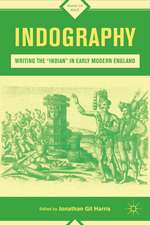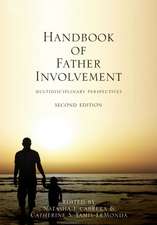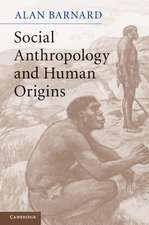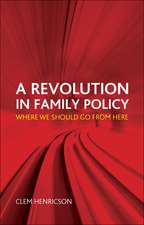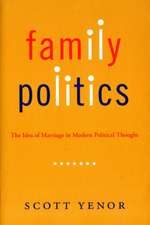What Kinship Is-And Is Not
Autor Marshall Sahlinsen Limba Engleză Hardback – 11 feb 2013
In this pithy two-part essay, Marshall Sahlins reinvigorates the debates on what constitutes kinship, building on some of the best scholarship in the field to produce an original outlook on the deepest bond humans can have. Covering thinkers from Aristotle and Lévy- Bruhl to Émile Durkheim and David Schneider, and communities from the Maori and the English to the Korowai of New Guinea, he draws on a breadth of theory and a range of ethnographic examples to form an acute definition of kinship, what he calls the “mutuality of being.” Kinfolk are persons who are parts of one another to the extent that what happens to one is felt by the other. Meaningfully and emotionally, relatives live each other’s lives and die each other’s deaths.
In the second part of his essay, Sahlins shows that mutuality of being is a symbolic notion of belonging, not a biological connection by “blood.” Quite apart from relations of birth, people may become kin in ways ranging from sharing the same name or the same food to helping each other survive the perils of the high seas. In a groundbreaking argument, he demonstrates that even where kinship is reckoned from births, it is because the wider kindred or the clan ancestors are already involved in procreation, so that the notion of birth is meaningfully dependent on kinship rather than kinship on birth. By formulating this reversal, Sahlins identifies what kinship truly is: not nature, but culture.
| Toate formatele și edițiile | Preț | Express |
|---|---|---|
| Paperback (1) | 114.67 lei 3-5 săpt. | +5.91 lei 6-12 zile |
| University of Chicago Press – sep 2014 | 114.67 lei 3-5 săpt. | +5.91 lei 6-12 zile |
| Hardback (1) | 575.42 lei 6-8 săpt. | |
| University of Chicago Press – 11 feb 2013 | 575.42 lei 6-8 săpt. |
Preț: 575.42 lei
Preț vechi: 747.30 lei
-23% Nou
Puncte Express: 863
Preț estimativ în valută:
110.10€ • 114.96$ • 91.13£
110.10€ • 114.96$ • 91.13£
Carte tipărită la comandă
Livrare economică 04-18 aprilie
Preluare comenzi: 021 569.72.76
Specificații
ISBN-13: 9780226925127
ISBN-10: 0226925129
Pagini: 120
Dimensiuni: 140 x 216 x 20 mm
Greutate: 0.27 kg
Editura: University of Chicago Press
Colecția University of Chicago Press
ISBN-10: 0226925129
Pagini: 120
Dimensiuni: 140 x 216 x 20 mm
Greutate: 0.27 kg
Editura: University of Chicago Press
Colecția University of Chicago Press
Notă biografică
Marshall Sahlins is the Charles F. Grey Distinguished Service Professor Emeritus at the University of Chicago. A member of the National Academy of Sciences and the British Academy, he is the author of many books, including Culture and Practical Reason, How “Natives” Think, Islands of History, and Apologies to Thucydides, all published by the University of Chicago Press.
Cuprins
Preface
1 What Kinship Is—Culture
2 What Kinship Is Not—Biology
Bibliography
Index
1 What Kinship Is—Culture
2 What Kinship Is Not—Biology
Bibliography
Index
Recenzii
“Sahlins catalogs brilliantly the varied ways in which people construct family ties completely apart from their genetic relationships. . . . This is cultural anthropology at its best.”
“Exhilarating. Sahlins’s essay has (re)captured a significant truth—freshly, memorably. He does so without pre-empting the diversity of conceptual interests that anthropologists find their category ‘kinship’ generates, or indeed the manifold truths to be spoken of people’s interrelations. Conversely, this bold articulation of co-presence, of people’s intersubjective participation in one another’s lives, does not need to be confined to discussions of kinship as usually understood. It is important, however, that Sahlins’s argument implies not just a communicative mutuality (reciprocity, anticipation of others’ intentions, etc.), but also mutuality of bodily and personal (in the sense of ‘transpersonal’) being. The book leaves a provocation with this reader: maybe we should think twice when this kind of mutuality flourishes in otherwise non-kinship contexts before taking it simply as an extension of kinship thinking from some pre-metaphorical base.”
“What Kinship Is—And Is Not is a gem of a book; a joy to read and a reminder of why I was enchanted by anthropology when I first encountered it. Ethnographic example tumbles after ethnographic example; many familiar, others less so, all attesting to the richness of the ethnographic record on that contested, albeit perennial, topic of kinship.”
“What Kinship Is is clearly destined to become something of a classic in kinship studies in anthropology. This is partly because of the huge breadth of Marshall Sahlins’s scholarship, which takes in everything from Aristotle to the most up to date references in the study of kinship, including a wonderful range of standard and lesser-known works along the way. But this of course is not just a work of synthesis; it is also an original, brilliant, and, above all, creative contribution to current debates in the discipline.”
“What Kinship Is—And Is Not exhibits its authors’ signature brilliance, erudition, and originality (not faulting wit), and it is impossible to address its many virtues. . . . Sahlins’s Janus-faced universalizing-particularizing orientation provides an encompassing context whose value for the exploration of both earlier and contemporary kinship concerns would be difficult to exaggerate.”
“Marshall Sahlins is one of the great names of modern anthropology, but thus far he has not counted as one of the key figures in the study of kinship. . . . but [The Use and Abuse of Biology] and the present text both show that Sahlins is knowledgeable about kinship and entirely capable of contributing something new to debates concerning it. . . . He has clearly ransacked the most recent literature in the search for relevant ethnography, though he also finds support for his argument in some of the older literature, going back to Tylor in 1865, and even to Plato. The basic theme, therefore, is not new, though his treatment of it is. Sahlins has given this phenomenon a name—“mutuality of being”—and that in itself will compel us to take notice of it.”
“What Kinship Is—And Is Not is a complex book, subtle and important. Since its publication in 2013, it has continued to challenge the experts. . . . It can be read as a response—late but brilliant—to the radical questioning initiated by Schneider more than forty years ago and the progressive marginalization of the field that followed the corrosive analytical critique that was last made in 1984. . . . The main merit of the book is that Sahlins has produced a remarkable critical synthesis of new kinship studies, which have remained somewhat underground for the last twenty years, despite their importance and their vitality. It is thanks to the diversity and quality of this rich ethnographic corpus that Sahlins was able to carry out his undertaking. Thus, this undisputed master of anthropology. . . . has managed to put these studies at the center of contemporary anthropological debate.”
“The work of Marshall Sahlins has continuously inspired whole academic generations of anthropologists. As with many of his previous interventions, this bold and incisive essay will be hailed as a beacon of lucidity in the somewhat foggy conceptual landscape of current anthropology. The all too neglected structuralist insight of the radical identity between sociality and semiosis is rescued and developed by Sahlins in a wonderfully refreshing way, with the help and the benefit of an easy, capacious scholarship that embraces everything from philosophy to linguistics to contemporary ethnography (from the Nichomachean Ethics to Benveniste on pronouns, from Amazonian couvade to Maori gift-exchange). This book musters deep and convincing arguments in favor of a thoroughly relational human ontology, bodying forth a renewed notion of internal or intrinsic relationality, which runs counter to the current infatuation with substances and impenetrable essences. It shows that what is natural in human culture is what is cultural in human nature: kinship, precisely.”
“What Kinship Is—And Is Not is a tour de force, even by Sahlinsian standards. Kinship is one of the oldest topics in anthropology, but by the 1970s it began to lose its centrality, partly under the weight of critiques which denied the cross-cultural validity of ‘kinship’ as an analytical category. Sahlins develops an incisive counter-critique of that position while at the same time radically reframing kinship as ‘mutuality of being,’ which he takes to be a pan-human phenomenon. A superb piece of anthropological writing, this book does a wonderful job of ethnographically substantiating that concept, along the way making several other major contributions to anthropological theory.”
“In What Kinship Is—And Is Not, Marshall Sahlins argues that kinship is culture, not biology, and he does so in the pure, uncompromising, vivid way of which he is the master. We now have the case for the cultural interpretation in the strongest imaginable form, which is at the same time a case for not splitting the difference in the quandary at the heart of kinship studies. It is a service of inestimable value, and all who study kinship will benefit.”




